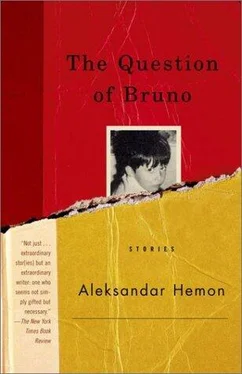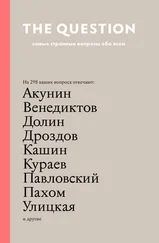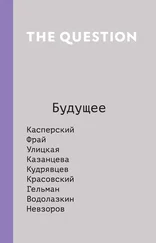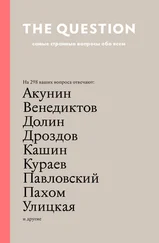“I don’t know,” Pronek said. “Local kinds.”
“Hmm,” Andrea’s father said.
“Andrea told us you were a writer,” Andrea’s mother said. She had fenestral glasses, and a pearl choker, and her teeth were white and orderly, like an ivory keyboard. Andrea’s father wore a tweed jacket with elbow patches, his ears were flappy, and when he stood against the light, Pronek could see a pink penumbra around his earlobes.
“I was,” Pronek said.
“We like good writing,” Andrea’s mother said.
“Have you ever read Richard Ford?” Andrea’s father asked.
“Sensitive middle-class macho shit,” Andrea snapped and looked at Pronek, who simply said: “No.”
“Very well written,” Andrea’s father said and shook his head, as if rattling it. “Very well written.”
“And we like Kundera,” Andrea’s mother said. “He’s from Czechoslovakia, too.”
“Who’s in the kitchen?” Nana asked, pricking up her ears, burdened by grayish clusters. She had twiggish arms from which crumpled skin hung like drying dough. She had a dim number tattooed between two veins on her right forearm.
“No one’s in the kitchen, Nana. We’re all here,” Andrea’s father said and googled his eyes at Pronek, asking for solidarity.
Andrea’s mother served a sequence of foods unknown to Pronek, with the taste and texture of minced cardboard (“This is wild rice,” she beamed at him nacreously), which he ate carefully, fearing a sudden accident, like chewing with his mouth open, or dropping a forkful of wild rice and salad “with maple-syrup-and-sunflower-seed dressing” into his lap. Pronek had a penetrating sense that his feet were about to begin exuding stench, so he covered his left-foot toes with his right foot, but then fretted that the hissing of sock friction might become too loud. He was convinced that he should move as little as possible, lest unnecessary motion release mischievous molecules of bodily odor.
“Who’s not here?” Nana asked. She would load her mouth and then chew patiently, looking at them with weary disinterest. Her hair was platinum white, but pink patches were clearly visible under the fluff, and her skull was right under the skin, it was right there, Pronek thought.
Then they had blackberry nonfat cheese cake with low-fat kiwi frozen yogurt and French hazelnut vanilla decaf coffee.
“So what’s going on in Czechoslovakia,” Andrea’s mother asked.
“Yugoslavia, Mom, Yugoslavia,” Andrea said.
“I read about it, I tried to understand it, but I simply can’t,” Andrea’s father said. “Thousands of years of hatred, I guess.”
“It’s a sad saga,” Andrea’s mother said. “It’s hard for us to understand, because we’re so safe here.”
“It’s mind-boggling,” Andrea’s father said.
“Where is Bruno? Is Bruno there in kitchen?” Nana hollered all of a sudden. “Bruno, come here.”
“Calm down, Nana. That’s not Bruno. Bruno’s gone,” Andrea’s mother said.
“Come here, Bruno!” Nana yelled toward the kitchen. “Eat with us! We have everything now!”
“Calm down, Nana. Or you’ll have to go to your room,” Andrea’s father said and turned to Pronek. “She can be rather obstreperous sometimes.” Pronek didn’t know what “obstreperous” meant, so he just said: “It’s okay. No problem.” Nana jiggled her jaw and calmed down. Andrea’s mother was scraping off the remnants of food, little piles of mush, onto a big plate.
“What you will do with it?” asked Nana. “Don’t throw it away, Bruno is hungry. Bruno!”
“We’re not going to throw it away,” Andrea’s mother said. “We’ll save it for Bruno.” Nana’s dentures clattered, rejoicing She had a quick slurp of coffee and then looked at Pronek.
“Who are you?” she asked.
“I’m Andrea’s friend,” Pronek said.
“Good,” she said.
While Pronek was putting on his shoes, revealing the dirt at their prows, Andrea’s father was holding his coat. “You should dry clean it,” he said. “I know,” Pronek said. Andrea’s mother pressed her cheek, soft and redolent of coconut, against Pronek’s, and kissed the air around his ear. “It was nice having you,” Andrea’s father said, shaking Pronek’s hand with habitual vigor. “I’m sure you’ll do fine if you stay here. This is the greatest country in the world, you just have to work hard.”
“That’s true,” Andrea’s mother said.
“Are you going to see Bruno?” Nana asked.
“No, Nana,” Pronek said. “I’m sorry.”
Romaine Lettuce, Iceberg Lettuce
Pronek got up, put on his best clothes: a gray silk shirt, once upon a time smuggled from China by a family friend, with an amoeba-shaped grease blot in the left-nipple area, as if involuntary lactation had taken place; the well-known orange-stained beige pants; a tie with a Mickey Mouse pattern, lent and consequently tied by Carwin; a peach-colored jacket, also generously lent by Carwin, who hadn’t worn it for years, one size too small, hence rather tight in the shoulders, so Pronek, with his arms protruding, looked like a sad forklift. He put on his shoes, which had tufts of algae-like dirty lint, once upon a time fake fur, sticking out on the sides.
This is the attire in which Pronek entered the American labor market.
Pronek let Moskva out, then followed her down the stairs. He thought of dust speckles whirling in the sunbeams as puny angels, although they paid little attention to him. He stood behind the screen door, as if waiting for a cue to enter the stage, looking down the street: tree-crowns were all upset, swaying furiously; the wind was flipping their leaves, as if to show they were unmarked. A man with a rottweiler that looked like the man’s canine self — the same pelican chin, the same doleful trot — bagged a handful of shit and then carried it reverently like a piece of valuable evidence, following the investigative, sniffing dog. The two alcoholic sisters, with identical plum eye bags, were heading toward their morning refreshment, bickering about who was culpable for not replenishing the booze supplies, still holding hands. There was a white Cadillac jalopy parked on the street, with the sign in the windshield saying: “Don’t tow it’s mine,” signed by “Jose.” The sky grumbled, as if someone were moving furniture in the universe above. He looked at the sky’s underbelly, at the clouds pressing the anxious trees, and enthusiastically frowned — it would rain again, he reckoned. He walked down Norwood, turned north on Broadway, facing the advancing traffic. He waited to cross Broadway at Granville — DON’T WALK the street light warned him. He imagined trying to run across the street and stumbling, a yellow cab trying to avoid his fallen body, but managing to run its front left wheel over his head, crushing it. He imagined the last thing he would see: the greasy underside of a car, layers of dirt covering the axle. He looked in our direction (although we are everywhere) before — WALK — crossing, and proceeded toward the El.
But then he saw a sign in the misty window of the ice cream parlor saying COME IN, so he decided to have some ice cream. He greeted the owner (in English), a Russian man who grew his mustache in proportion to the growth of his business.
At this particular moment, it was the thin mustache of a passionate toreador.
Pronek got a large scoop of rainbow sorbet, and began licking it with ardor immediately, careful to devote equal attention to each color, his tongue becoming multicolored in the process. He foolishly glanced at the corner drug dealer, who mad-dogged him for an intense moment. Pronek collected himself enough to look down at the tips of his shoes, which were habitually uncomfortable, while his tormented big toe occasionally wiggled in pain.
Читать дальше












